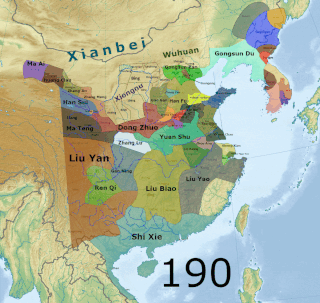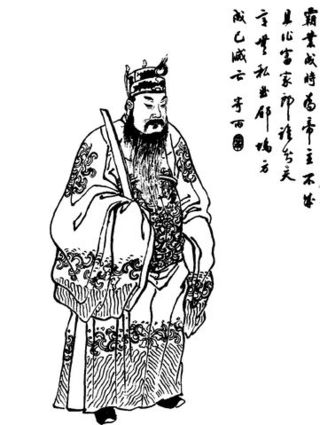Related Research Articles
The 190s decade ran from January 1, 190, to December 31, 199.

The Three Kingdoms of Cao Wei, Shu Han, and Eastern Wu dominated China from 220 to 280 AD following the end of the Han dynasty. This period was preceded by the Eastern Han dynasty and followed by the Western Jin dynasty. Academically, the periodisation begins with the establishment of Cao Wei in 220 and ends with the conquest of Wu by Jin in 280. The period immediately preceding the Three Kingdoms from 184 to 220 was marked by chaotic infighting among warlords across China as Han authority collapsed. The period from 220 to 263 was marked by a comparatively stable arrangement between Cao Wei, Shu Han, and Eastern Wu. This stability broke down with the conquest of Shu by Wei in 263, followed by the usurpation of Cao Wei by Jin in 266, and ultimately the conquest of Wu by Jin in 280.

Emperor Xian of Han, personal name Liu Xie (劉協), courtesy name Bohe, was the 14th and last emperor of the Eastern Han dynasty in China. He reigned from 28 September 189 until 11 December 220.

Dong Zhuo, courtesy name Zhongying, was a Chinese military general, politician, and warlord who lived in the late Eastern Han dynasty. At the end of the reign of the Eastern Han, Dong Zhuo was a general and powerful minister of the imperial government. Originally from Liang Province, Dong Zhuo seized control of the imperial capital Luoyang in 189 when it entered a state of turmoil following the death of Emperor Ling of Han and a massacre of the eunuch faction by the court officials led by General-in-Chief He Jin.

Yuan Shao, courtesy name Benchu (本初), was a Chinese military general, politician, and warlord who lived in the late Eastern Han dynasty. He occupied the northern territories of China during the civil wars that occurred towards the end of the Han dynasty. He was also an elder half-brother of Yuan Shu, a warlord who controlled the Huai River region, though the two were not on good terms with each other.

Xun Yu (163–212), courtesy name Wenruo, was a Chinese military official and politician who served as an adviser to the warlord Cao Cao during the late Eastern Han dynasty of China.

Wang Yun, courtesy name Zishi, was a Chinese politician who lived during the late Eastern Han dynasty. He served in the Han government through the reigns of three emperors – Emperor Ling, Emperor Shao and Emperor Xian. The highest offices he served in were Manager of the Affairs of the Masters of Writing and Minister over the Masses in the early reign of Emperor Xian. In 192, with help from the general Lü Bu and others, he plotted a successful coup in Chang'an against Dong Zhuo, a tyrannical warlord and regent who controlled the Han central government, and assassinated him. However, later that year, Dong Zhuo's followers staged a counter-coup and seized back control of the central government in Chang'an. Wang Yun, along with his family members, was captured and executed.

Li Jue, courtesy name Zhiran, was a Chinese military general, politician, and warlord serving under the autocratic warlord Dong Zhuo during the late Eastern Han dynasty of China. He later succeeded Dong Zhuo as the leader of the Liang Province faction after Dong Zhuo was murdered in a coup d'état, and was able to take over the Han imperial capital Chang'an, keeping Emperor Xian as a hostage. Despite being adept in military affairs, he was inept at politics, quarrelling with his fellow generals and making the bad decision to let Emperor Xian escape, greatly decreasing his power and precipitating his downfall.
Zhu Jun, courtesy name Gongwei, was a military general and official who lived during the Eastern Han dynasty of China.

Guo Si, also known as Guo Duo, was a Chinese military general, politician, and warlord serving under the warlord Dong Zhuo during the late Eastern Han dynasty of China. He assisted Dong Zhuo in his many campaigns and served as a subordinate of Dong Zhuo's son-in-law, Niu Fu, after Dong Zhuo relocated the imperial capital to Chang'an. He later became one of the de facto regents of Emperor Xian, wherein they occupied the capital and held the emperor and imperial officials hostage. However, his downfall came when he quarrelled with his co-regent, Li Jue. He and Li Jue were ultimately defeated by Yang Feng and Dong Cheng, who assisted the emperor to flee the capital. Guo Si was eventually betrayed and murdered by one of his subordinates.
Dong Cheng was a Chinese military general who lived during the late Eastern Han dynasty of China. He was also the father of Lady Dong, a concubine of Emperor Xian.

The end of the Han dynasty was the period of Chinese history from 189 to 220 CE, roughly coinciding with the tumultuous reign of the Han dynasty's last ruler, Emperor Xian. It was followed by the Three Kingdoms era. During the end of the Han dynasty, the country was thrown into turmoil by the Yellow Turban Rebellion (184–205). Meanwhile, the Han Empire's institutions were destroyed by the warlord Dong Zhuo and fractured into regional regimes ruled by various warlords, some of whom were nobles and officials of the Han imperial court. The warlord Cao Cao took control of Emperor Xian and his court in 196 and began gradually reunifying the empire. Cao Cao ostensibly operated under Emperor Xian's rule, though in reality the emperor was a hostage.
Xu Rong was a military general serving under the warlord Dong Zhuo during the late Eastern Han dynasty of China.

Romance of the Three Kingdoms is a Chinese television series adapted from the classical 14th century novel of the same title by Luo Guanzhong. The series was produced by China Central Television (CCTV) and was first aired on the network in 1994. It spanned a total of 84 episodes, each approximately 45 minutes long. One of the most expensive television series produced at the time, the project cost 170 million yuan. It was completed over four years and involved over 400,000 cast and crew members, including divisions of the People's Liberation Army from the Beijing, Nanjing and Chengdu military regions. Some of the dialogue spoken by characters was adapted directly from the novel. Extensive battle scenes, such as the battles of Guandu, Red Cliffs and Xiaoting, were also live-acted.

The Campaign against Dong Zhuo was a punitive expedition initiated by a coalition of regional officials and warlords against the warlord Dong Zhuo in 190 in the late Eastern Han dynasty. The members of the coalition claimed that Dong had the intention of usurping the throne by holding Emperor Xian hostage and by establishing a strong influence in the imperial court. They justified their campaign as to remove Dong from power. The campaign led to the evacuation of the capital Luoyang and the shifting of the imperial court to Chang'an. It was a prelude to the end of the Han dynasty and, subsequently, the Three Kingdoms period.

Fan Chou was a general serving under the warlord Dong Zhuo during the late Eastern Han dynasty of China.
Zhang Ji was a military general serving under the warlord Dong Zhuo during the late Eastern Han dynasty of China.

Cao Cao is a Chinese television series based on the life of Cao Cao, a warlord who rose to power towards the end of the Eastern Han dynasty and laid the foundation for the state of Cao Wei in the Three Kingdoms period. Directed by Hu Mei, the series aimed to portray a more historically accurate image of Cao Cao, who is traditionally depicted as a villain in Chinese culture. Starring Zhao Lixin as the eponymous character, the series was filmed at the Xiangshan Film City in Ningbo, Zhejiang between 1 November 2011 and 15 March 2012.

The Battle of Chang'an, also known as the Sack of Chang'an, took place in the western Chinese imperial capital city of Chang'an on 28 June 192, at the end of the Han dynasty, the prelude of the Three Kingdoms.
References
- Chen, Shou (3rd century). Records of the Three Kingdoms (Sanguozhi).
- Fan, Ye (5th century). Book of the Later Han (Houhanshu).